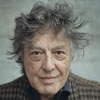A special project for 92Y Unterberg Poetry Center’s 75th anniversary, 75 at 75 invites authors to listen to a recording from our archive and write a personal response. Here, Tom Stoppard writes about two recordings of Harold Pinter—from November 12, 1964, and October 3, 1989. In the 1964 recording, Pinter reads poetry and stories and takes audience questions. In the 1989 recording (above), Pinter reads a scene from The Hot House, his short play One for the Road and is interviewed by Mel Gussow. These evenings were recorded live at 92Y.
Posted on Jan 15, 2014
 I listened to the recordings of two evenings with Harold Pinter at the Y—both his readings (from stories, poems and plays) and also his answers to questions that followed. The first recording was made on November 12, 1964, and the second was made on October 3, 1989. I listened to both of them with a pen in my hand, ready to write down any especially resonant comment Harold might make. I had done such a thing once before, a long time ago, more than fifty years ago, but on that occasion, in January 1962, I was not listening to a recording; I was in the same room with the author as he subjected himself to a Q&A after a student production of The Birthday Party in Bristol. I was there as a reporter on the local paper, and I wrote down pretty much everything he said, because to me, and, I hoped, to my readers, everything had a resonant quality.
I listened to the recordings of two evenings with Harold Pinter at the Y—both his readings (from stories, poems and plays) and also his answers to questions that followed. The first recording was made on November 12, 1964, and the second was made on October 3, 1989. I listened to both of them with a pen in my hand, ready to write down any especially resonant comment Harold might make. I had done such a thing once before, a long time ago, more than fifty years ago, but on that occasion, in January 1962, I was not listening to a recording; I was in the same room with the author as he subjected himself to a Q&A after a student production of The Birthday Party in Bristol. I was there as a reporter on the local paper, and I wrote down pretty much everything he said, because to me, and, I hoped, to my readers, everything had a resonant quality.
Now here I was again, pen in hand, in November 2013, listening to Harold Pinter dealing with questions. The irresistible metaphor is of a batsman at cricket dealing with successive balls bowled at him, all the more irresistible for the cricketing terms available for causing bemusement; Pinter dispatching off-spinners, long hops, full tosses and googlies with his on drive, his leg glance, his late cut, his pull shot. . .
The first thing I was listening for, in these two recordings separated by 25 years, was a sign of change in the man. But Harold was always his own man, and that man is as firmly in evidence in 1964 as in 1989, a man being as honest about himself as he could be. Latterly, he was a writer driven by politics, so there is a natural tendency to look for, indeed to find, the politics in his work from the start. When this ball is duly bowled at him at the Y, he starts off positioning himself as to accept the idea, but then quickly plays (as we say) a straight bat: no, he did not see himself as a political playwright in earlier days. He mentions The Birthday Party and Old Times as examples of plays where politics is nowhere on his mind. I’m glad to hear it from the man himself. The plays which made his name were not about the general state of things, they were about the mystery and uniqueness of particular lives.
But I mustn’t forget to pass on the remarks which I wrote down from the Y recordings as suggesting a resonance with the life and work of Harold Pinter. I find that I wrote down only two remarks. (1) “There will now be a short pause to let any latecomers in.” (2) “I would be very glad if you could shut that door at the back.”
Tom Stoppard’s The Real Thing will return to Broadway in fall 2014.